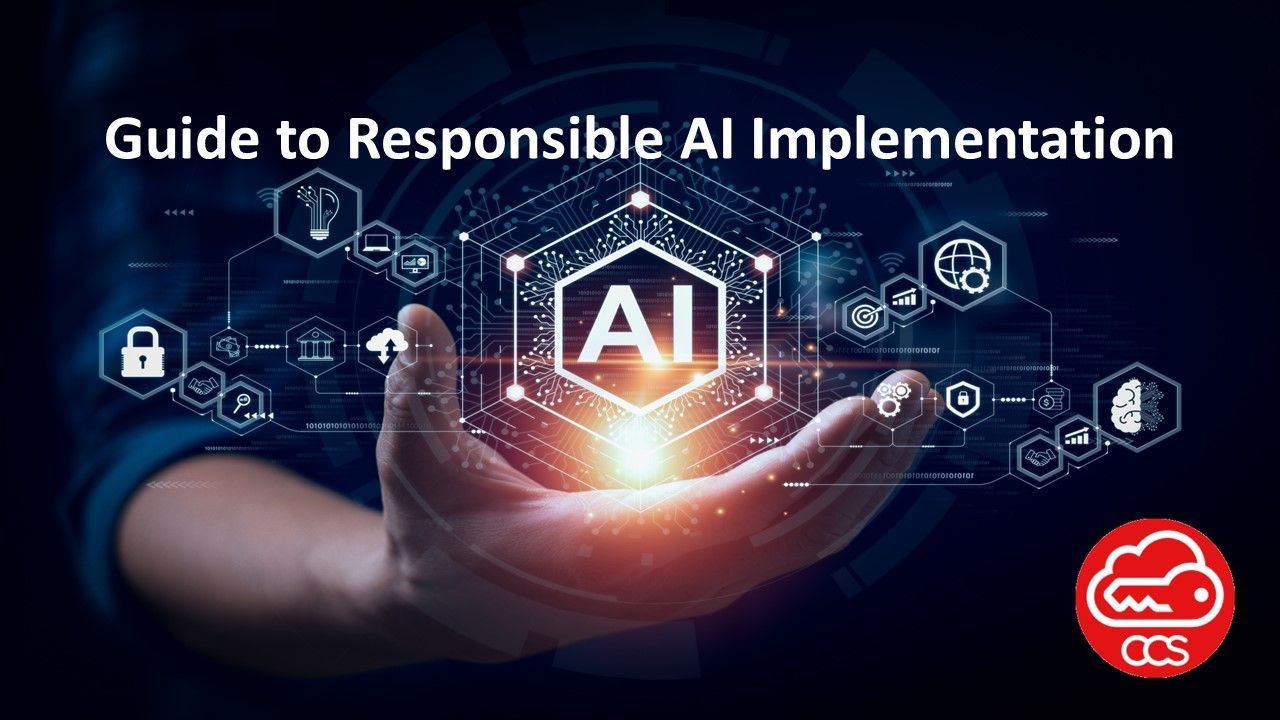A Guide to Responsible AI Implementation for Businesses
As businesses increasingly turn to Artificial Intelligence (AI) to drive innovation and efficiency, the need for a structured and responsible approach to AI implementation has never been more crucial. This guide offers a comprehensive roadmap for organisations aiming to harness the power of AI while navigating the complex challenges it presents.
From defining clear objectives and ensuring data readiness to managing ethical concerns and complying with regulations, this guide covers all the essential considerations.
Additionally, it introduces the ISO 42001 standard, a key framework for managing AI systems responsibly and effectively, helping businesses align their AI initiatives with best practices and emerging regulations. Whether you are just beginning your AI journey or looking to optimise your existing systems, this guide provides valuable insights to help you achieve success in the rapidly evolving AI landscape.
Key Considerations for AI Implementation
1. Clear Objectives and Use Cases
- Define Goals:
- Establish specific, measurable objectives for what you want to achieve with AI. Whether it’s improving customer experience, optimising operational efficiency, or driving innovation, clearly defined goals are essential for success.
- Identify Use Cases:
- Prioritise areas where AI can deliver the most value. Start with smaller, manageable projects that offer quick wins, then expand into more complex applications as your AI capabilities mature.
2. Data Readiness
- Data Quality:
- AI systems depend on high-quality data. Ensure your data is accurate, relevant, and well-organised to prevent skewed or unreliable outcomes.
- Data Volume:
- Machine learning models, in particular, require substantial amounts of data. Assess whether your organisation has access to enough data to train AI models effectively.
- Data Integration:
- Consider how AI systems will integrate with your existing data infrastructure. You may need to invest in data warehousing solutions to manage and consolidate data efficiently.
3. Technology Infrastructure
- Scalability:
- Your IT infrastructure must be capable of supporting AI workloads, including increased computational demands and storage needs. Cloud solutions are often ideal for scalable AI implementations.
- Integration:
- Ensure that AI systems can be integrated smoothly with your existing technology stack, including ERP, CRM, and other critical business applications.
4. Talent and Expertise
- Skills and Expertise:
- AI implementation requires a blend of data science, AI engineering, and domain-specific expertise. Evaluate whether your organisation has the necessary talent in-house or if additional hiring or training is needed.
- Collaboration:
- Foster collaboration between AI experts and business leaders to align AI initiatives with broader business goals and ensure successful implementation.
5. Ethics and Compliance
- Bias and Fairness:
- AI systems can inadvertently perpetuate biases inherent in data. Implement strategies to monitor and mitigate bias to ensure fair and equitable outcomes.
- Transparency:
- Ensure that AI systems operate transparently, particularly in regulated industries where stakeholders need to understand how decisions are made.
- Regulatory Compliance:
- Stay informed about regulations governing AI, such as GDPR in Europe, and ensure that your AI systems comply with all relevant laws and standards.
6. Change Management
- Cultural Shift:
- AI implementation may require significant cultural change within your organisation. Employees may need to adapt to new workflows and processes, and there may be concerns about job displacement.
- Training and Education:
- Provide training to help employees understand the role of AI and how it will affect their work. Emphasise that AI is a tool to enhance human capabilities, not replace them.
- Communication:
- Clearly communicate the objectives and benefits of AI initiatives to all stakeholders to build support and understanding across the organisation.
7. Cost and ROI
- Initial Investment:
- AI projects often require substantial upfront investments in technology, talent, and data management. Be prepared for these costs and ensure they are justified by long-term benefits.
- ROI Analysis:
- Conduct thorough ROI analysis to understand the long-term benefits versus costs. Define key performance indicators (KPIs) to measure the impact of AI over time.
8. Security Considerations
- Data Security:
- Protect sensitive data used in AI models from breaches and unauthorised access through robust cybersecurity measures.
- AI System Security:
- Safeguard AI systems themselves from hacking and manipulation, particularly in mission-critical applications.
9. Vendor and Tool Selection
- Choose the Right Tools:
- Evaluate AI tools and platforms based on your specific needs, scalability, and ease of integration with existing systems.
- Vendor Partnerships:
- Consider partnering with experienced AI vendors who can provide not only the technology but also the support and expertise necessary for successful implementation.
10. Pilot Testing
- Start Small:
- Begin with pilot projects to test the effectiveness of AI in your business context. Use these pilots to identify challenges and refine your approach before scaling AI across the organisation.
- Iterative Improvement:
- Continuously iterate and improve your AI systems based on feedback and performance metrics.
11. Long-Term Strategy
- Sustainability:
- Develop a long-term AI strategy that includes continuous learning, adaptation, and improvement of AI systems.
- Future-Proofing:
- Stay informed about AI trends and emerging technologies to ensure that your AI systems remain competitive and aligned with future business needs.
12. Legal and Intellectual Property (IP) Considerations
- IP Management:
- Understand the ownership of AI models, data, and insights generated by AI, especially when working with third-party vendors.
- Contractual Agreements:
- Ensure that contracts with AI vendors clearly define data ownership, usage rights, and intellectual property.
The Role of ISO 42001 in AI Implementation
As businesses navigate the complexities of AI implementation, adopting the ISO 42001 standard can provide a structured and comprehensive approach to managing AI systems responsibly and effectively.
What is ISO 42001?
ISO 42001 is an international standard that establishes a framework for AI management systems, focusing on responsible and ethical AI development, implementation, and maintenance. The standard emphasises risk management, transparency, and continuous improvement, ensuring that AI systems are developed and operated in a manner that aligns with both business goals and ethical standards.
How ISO 42001 Can Benefit Your Business:
- Demonstrates Commitment to Responsible AI:
- By adopting ISO 42001, businesses can show their dedication to responsible AI practices, building trust with customers, investors, and regulators.
- Improves AI System Quality and Security:
- The standard helps ensure that AI systems meet high standards for quality, security, traceability, and transparency, which are essential for building trust and reliability.
- Enhances Risk Management:
- ISO 42001 provides a framework for identifying and mitigating risks associated with AI systems, leading to more efficient and effective AI deployment.
- Ensures Regulatory Compliance:
- The standard aligns with major regulatory frameworks, such as the EU AI Act, helping businesses ensure compliance with relevant laws and avoid potential legal issues.
- Supports Ethical AI Use:
- ISO 42001 provides guidelines for the ethical use of AI, particularly in sensitive areas like healthcare, finance, and law enforcement, helping businesses navigate complex ethical challenges.
- Balances Governance and Innovation:
- While ISO 42001 provides a structured approach to AI management, it also allows for the flexibility needed to innovate and stay competitive in a rapidly evolving landscape.
- Builds a Trustworthy
- AI Management System: By adopting ISO 42001, businesses can establish a robust AI management system that stakeholders can trust, facilitating the wider adoption and acceptance of AI technologies.
The implementation of AI systems in business is a complex but rewarding endeavour that requires careful planning, ethical considerations, and a strategic approach. By considering the key factors outlined above, businesses can better position themselves to harness the full potential of AI while mitigating risks.
ISO 42001 serves as a vital tool in this process, providing a comprehensive framework for responsible and effective AI management. By adopting this standard, businesses can ensure that their AI systems are not only innovative but also transparent, secure, and aligned with ethical and regulatory standards. This will not only build trust with stakeholders but also provide a competitive edge in the rapidly evolving AI landscape.
As AI continues to shape the future of business, ISO 42001 offers a roadmap for navigating this transformative technology responsibly and effectively.






